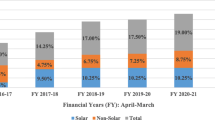Abstract
Global energy architecture changes under the influence of energy transitions and geopolitical events, which actualize the task of strengthening Kazakhstan’s energy security. The study aims to analyse the prospects for cooperation in the field of energy security within the framework of the Energy Club of the Shanghai Cooperation Organisation (SCO) and assess the potential benefits for Kazakhstan. The study used the following. Structural-functional, forecasting systems, and comparative analysis. The study demonstrates that Kazakhstan needs to transform its energy system, and the SCO Energy Club has the potential to attract investment and technology in this area. Promising areas of cooperation in the fields of renewable and hydrogen energy and the digitalization of energy infrastructure are identified. A significant asymmetry in the economic and technological potential of the key SCO Energy Club members was noted. This complicates the development of a balanced agenda for energy cooperation within the SCO. It is concluded that the SCO Energy Club can become a platform for the formation of a new multipolar energy geopolitics, provided that the interests of all participants are considered. In the context of the global energy transition, Kazakhstan faces the need for a large-scale transformation of the energy sector. The country needs significant investments in the development of renewable energy sources, hydrogen technologies, and the modernization of its electricity infrastructure. Participation in the SCO Energy Club is seen as an opportunity to attract financial resources and advanced technologies from SCO partners to address these challenges. Specific promising areas of Kazakhstan’s cooperation in the field of green energy have been identified, including the implementation of joint projects in solar and wind energy, hydrogen production, and hydrogen export. Opportunities for the digitalization of Kazakhstan’s electricity infrastructure through the transfer of Chinese and other technologies were identified. For Kazakhstan, cooperation within the SCO Energy Club opens up prospects for diversifying export energy markets, attracting investment in the development of energy infrastructure, and increasing energy independence. The practical significance of the study lies in the development of recommendations for utilising the potential of the SCO Energy Club to strengthen energy security and build up Kazakhstan’s energy potential.

Similar content being viewed by others
Data Availability
Datasets from this study are available upon reasonable request to the corresponding author.
References
Abbas, Z., Kalim, I., & Malik, M. S. (2019). CASA-1000: Its potential for regional trade and development. Global Political Review, 4(3), 39–48.
Abytov, F. (2023). Kazakhstan’s oil and gas industry: Prospects, trends, look into future. The Astana Times. Retrieved Mar 8, 2024, https://astanatimes.com/2023/10/kazakhstans-oil-and-gas-industry-prospects-trends-look-into-future/.
Aggarwal, P. (2022). China’s energy diplomacy and its investments abroad: Functions, challenges, achievements, and influence. In: China’s Energy Security: The Journey from Self-Sufficiency to Global Investor (pp. 27–88). Singapore: Palgrave Macmillan.
AlHumaidan, F.S., Halabi, M.A., Rana, M.S., & Vinoba, M. (2023). Blue hydrogen: Current status and future technologies. Energy Conversion and Management, 283, 116840.
Auanasova A. M. (2023). From the history of the Shanghai Cooperation Organisation. In: Proceedings of the International Scientific-Practical Conference “Shanghai Cooperation Organization Countries: Historical Commonality and Prospects for Cooperation” (pp. 55–61). Тoshkent: National University of Uzbekistan named after Mirzo Ulugbek.
Bizhikeeva, M. (2020). Bauyrzhan Aitkulov: Lithium could become Kazakhstan’s second oil. Retrieved Dec 10, 2023, https://kapital.kz/experts/91508/bau-yrzhan-aytkulov-litiy-mozhet-stat-vtoroy-neft-yu-dlya-kazakhstana.html
Boute, A. (2023). Shaping the Eurasian gas market: The geopolitics of energy market regulation. Geopolitics, 28(5), 2042–2073.
CASA-1000 Project Map. (2018). Retrieved Dec 7, 2023, https://casa-1000.kg/casa-1000-map
Hannan, M. A., Al-Shetwi, A. Q., Begum, R. A., Ker, P. J., Rahman, S. A., Mansor, M., Mia, M. S., Muttaqi, K. M., & Dong, Z. Y. (2021). Impact assessment of battery energy storage systems towards achieving sustainable development goals. Journal of Energy Storage, 42, 103040.
Ihnatenko, M., Marmul, L., Romanіuk, I. (2023). Development of competitive strategies by enterprises in the globalization of market. University Economic Bulletin, 18(2), 45–51.
Islamova, A. T. (2020). Cooperation between the Republic of China and the Republic of Kazakhstan within the framework of the Shanghai Cooperation Organization. Bulletin of Abai Kazakh National Pedagogical University. Series “International Affairs and Politics”, 63(4), 92–96.
Law of the Republic of Kazakhstan No. 465 “On Ratification of the Charter of the Shanghai Cooperation Organisation”. (2003, July). Retrieved Dec 7, 2023, https://adilet.zan.kz/rus/docs/Z030000465_
Li, K., & Shen, W. (2022). Does SCO need its own energy charter treaty? From the perspective of Chinese BITs. Journal of World Energy Law & Business, 15(2), 114–135.
Nazirov, M., & Gofurov, D. (2023). Central Asia and Chinese approaches to cooperation within the SCO framework. International Journal of Formal Education, 2(6), 140–145.
Nuñez-Jimenez, A., & De Blasio, N. (2022). The future of renewable hydrogen in the European Union: Market and geopolitical implications. Cambridge: HKS Belfer Center for Science and International Affairs.
Oğuz, S., & Karabulut, B. (2022). The rise of Shanghai cooperation organization in Central Asia: A tool of cooperation or competition between Russia and China on Turkic States? Cappadocia Journal of Area Studies, 4(2), 175–193.
Parepa, L.-A. (2020). The Belt and Road Initiative as continuity in Chinese foreign policy. Journal of Contemporary East Asia Studies, 9(2), 175–201.
Pizzolo, P., & Carteny, A. (2022). The “New Great Game” in Central Asia: From a Sino-Russian axis of convenience to Chinese primacy? International Spectator, 57(2), 85–102.
Popović, S. (2020). Geopolitical position of the Shanghai Cooperation Organization within the Belt and Road Initiative. Asian Issues, 6(1), 73–91.
Proń, E. (2023). China in Central Asia: The Shanghai Cooperation Organization, new developments and roles in 2013–2021. In: M. Sahakyan (Ed.), China and Eurasian Powers in a Multipolar World Order 2.0: Security, Diplomacy, Economy and Cyberspace (pp. 93–104). London: Routledge.
Rab, A., & Zhilong, H. (2019). China and Shanghai Cooperation Organization (SCO): Belt and Road Initiative (BRI) perspectives. International Journal of Humanities and Social Sciences, 9(2), 166–171.
Rousselot, H. (2011). The Energy Club of the SCO: A (driving) element of regional integration? Relations Internationales, 145(1), 117–132.
Scott-Smith, G. (2020). The Shanghai Cooperation Organisation. In: M.O. Hosli & J. Selleslaghs (Eds.), The Changing Global Order: Challenges and Prospects (pp. 177–191). New York: Springer Cham.
Shayakhmetova, Zh. (2021). Kazakhstan Declares its Carbon Neutrality Targets at UN Climate Change Conference in Glasgow. Retrieved Dec 10, 2023, https://astanatimes.com/2021/11/kazakhstan-declares-its-carbon-neutrality-targets-at-un-climate-change-conference-in-glasgow/
Strojny, J., Krakowiak-Bal, A., Knaga, J., & Kacorzyk, P. (2023). Energy security: A conceptual overview. Energies, 16(13), 5042.
Sun, D., Xu, H., & Tu, Y. (2022). In with the new: China’s nuclear-energy diplomacy in the Middle East. Middle East Policy, 29(1), 41–60.
Tang, W., & Joldybayeva, E. (2023). Pipelines and power lines: China, infrastructure and the geopolitical (re)construction of Central Asia. Geopolitics, 28(4), 1506–1534.
Tsybukh, V. (2023). The role of natural resources in international relations in the 20th – early 21st century. Foreign Affairs, 33(2), 57–64.
Ünaldılar Kocamaz, S. (2019). The rise of new powers in world politics: Russia, China and the Shanghai Cooperation Organization. Uluslararası İlişkiler, 16(61), 127–141.
Van Hoecke, L., Laffineur, L., Campe, R., Perreault, P., Verbruggen, S. W., & Lenaerts, S. (2021). Challenges in the use of hydrogen for maritime applications. Energy & Environmental Science, 14(2), 815–843.
Wishart, A., & Abidi, A. (2021). The energy transition in Central Asia: drivers, policy and opportunities. Construction Law International, 16(4), 28.
Xinlei, L. (2023). Clean energy diplomacy: Global trend and China’s path. London: Routledge.
Xue, Y., & Makengo, B. M. (2021). Twenty years of the Shanghai Cooperation Organization: Achievements, challenges and prospects. Open Journal of Social Sciences, 9(10), 184–200.
Yu, K. (2023). China’s energy security in the twenty-first century: The role of global governance and climate change. Hong Kong: Hong Kong University Press.
Funding
This research received no external funding.
Author information
Authors and Affiliations
Contributions
OB, KWCH, and FK designed the study. KB collected and analyzed the data. MA wrote the manuscript. All authors reviewed and approved the final version.
Corresponding author
Ethics declarations
Ethical Approval
Not applicable.
Consent to Participate
Not applicable.
Consent to Publish
Not applicable.
Conflict of Interest
The authors have stated explicitly that there are no conflicts of interest in connection with this article.
Additional information
Publisher’s Note
Springer Nature remains neutral with regard to jurisdictional claims in published maps and institutional affiliations.
Electronic Supplementary Material
Below is the link to the electronic supplementary material.
Rights and permissions
Springer Nature or its licensor (e.g. a society or other partner) holds exclusive rights to this article under a publishing agreement with the author(s) or other rightsholder(s); author self-archiving of the accepted manuscript version of this article is solely governed by the terms of such publishing agreement and applicable law.
About this article
Cite this article
Baisalbek, O., Hor, K.W.C., Kukeyeva, F. et al. Exploring Opportunities and Limitations of Kazakhstan’s Multilateral and Bilateral Cooperation in Renewable Energy within Central Asia: A Comprehensive Analysis. East Asia (2024). https://doi.org/10.1007/s12140-024-09425-z
Received:
Accepted:
Published:
DOI: https://doi.org/10.1007/s12140-024-09425-z




